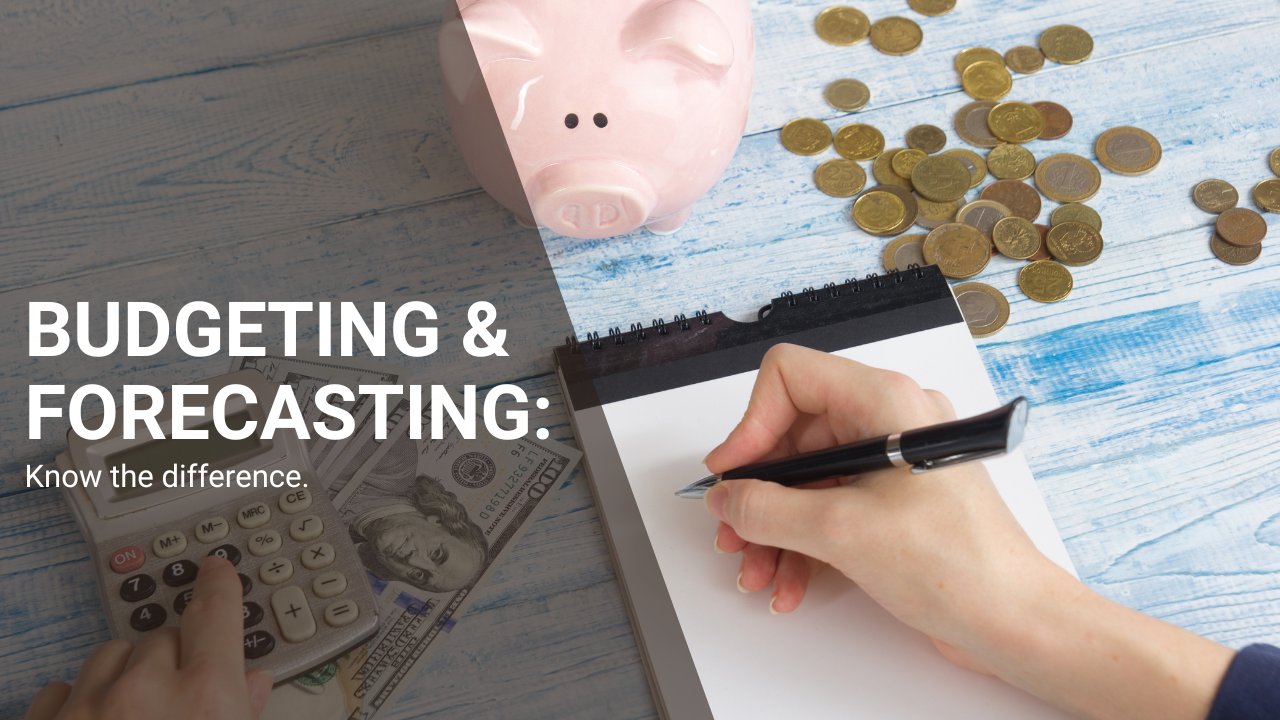Budgeting and Forecasting for Small Business Success: Know the Difference

Good things come in pairs: Simon and Garfunkel. Burger and fries. Stars and Stripes. Surf and Turf.
And Budgeting and Forecasting.
As a small business owner, carefully planning your finances is a must if you want to stay IN business; budgeting and forecasting are two essential tools that can help you achieve this goal. Although they may sound the same, they serve uniquely different purposes and play a crucial role in shaping the financial health of your small business.
In this post, we'll dive into the differences between budgeting and forecasting, why they are both essential, and how they can affect your business's success and financial well-being.
Budgeting vs. Forecasting
Before delving into the importance of budgeting and forecasting, let's clarify the difference between these two financial processes:
Budgeting is like a roadmap that tells you what money is coming in and what you'll spend it on for a year. It helps you set financial goals and use your resources wisely. Your budget is like a way to measure how you're doing financially. By making a budget, you're basically deciding how you want to manage your money.
Forecasting, on the other hand, is a process that helps you estimate how your finances will perform in the future. It's based on historical data, market trends, and other factors that are relevant to your situation. Forecasts give you an idea of what to expect so you can make better decisions and adapt to changes. Unlike a budget, which tells you how to manage your money, a forecast predicts how things will probably turn out. It's a valuable tool for planning and strategizing.
Why You Need Both
Small businesses often wonder whether they should focus on budgeting, forecasting, or both. The truth is that they are complementary tools. Would Michael Jordan be the player he was without Scottie Pippin? (No.) Both are necessary for the following reasons:
1. Goal Setting: Budgeting helps you set clear financial goals and plan how to achieve them. You define your revenue and expense targets, which act as a benchmark for measuring your performance.
2. Flexibility: Forecasting allows you to adjust your plans as the market evolves. It provides insights into potential challenges and opportunities, helping you adapt your strategies.
3. Risk Mitigation: A well-prepared forecast can alert you to potential financial pitfalls, enabling you to take preventive measures, such as building up cash reserves or cutting costs, before problems arise.
4. Decision-Making: Forecasts aid decision-making by providing a basis for evaluating different scenarios. Should you invest in new equipment, hire more employees, or expand to a new location? Forecasts can help answer these questions.
5. Investor and Lender Confidence: Investors and lenders often require both budgets and forecasts to assess your business's financial health and growth potential. Having these tools in place can increase your chances of securing financing.
Effect on Success and Financial Health
Just like a plate of eggs is made 100% better with a side of bacon, the combination of budgeting and forecasting can significantly impact the success and financial health of your small business:
1. Financial Stability: Budgets help maintain financial discipline and control. Staying within budget limits can prevent overspending and accumulating debt, contributing to the long-term financial stability of your business.
2. Growth Opportunities: Accurate forecasting can help you identify opportunities for growth or expansion, allowing your business to seize the right moment to invest or diversify.
3. Risk Mitigation: Forecasts are essential for risk assessment. By identifying potential financial challenges early, you can take corrective actions, preventing crises that could otherwise harm your business.
4. Long-Term Planning: Budgets and forecasts provide a foundation for long-term strategic planning. They allow you to set and achieve financial goals that contribute to your business's sustainability.
Small businesses need to use budgeting and forecasting to maintain financial health, make informed decisions, and achieve success. One will help you set financial goals and keep your business accountable, while the other will help you navigate unpredictable situations. It's a perfect pairing. By combining these two practices, you'll build a solid financial foundation for your business and ensure that you stay as prosperous and successful as a peanut butter and jelly sandwich.



